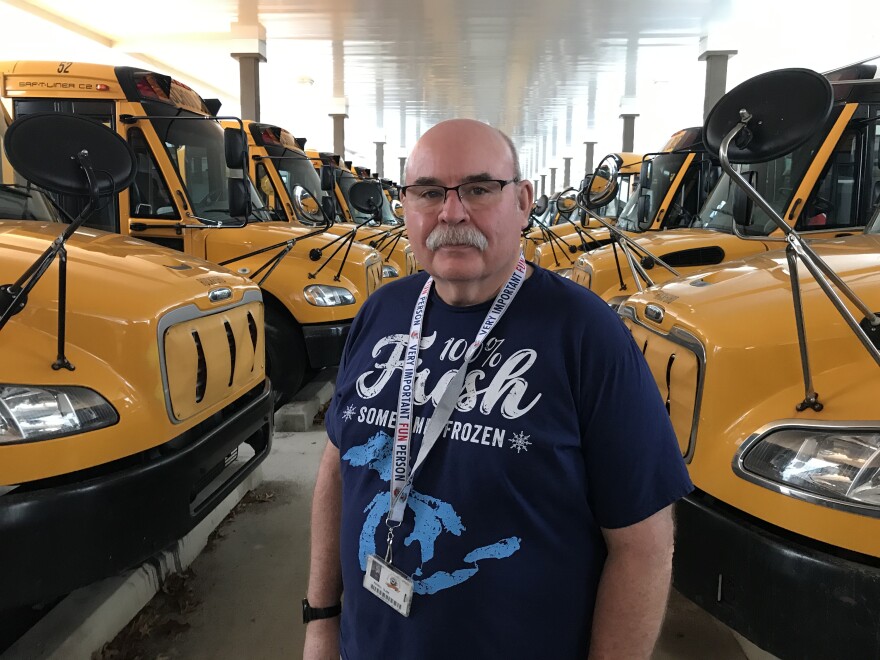Every day, 25 million American kids board that big yellow school bus with emotions running the gamut between excitement and anxiety. That's especially true for students with physical or emotional challenges.Now, some Michigan bus drivers are putting on blindfolds and riding as passengers to better understand their riders’ experience.
Going The Extra Mile
Dean Transportation in Lansing is one of the nation’s largest private school bus companies.
Every day, its fleet of 1,700 buses log 125,000 thousand miles. If that were one long road, it would circle the Earth five times.
But the distance is far less important than the passengers.
“We transport about 80,000 children in Michigan each day,” said Dean safety and training director Fred Doelker. “About two-thirds of those children are special needs kids.”
Some are visually impaired. Others use wheelchairs. Still others are on the autism spectrum.
Doelker teaches “empathy skills” to his drivers. There’s a lot of terms that convey empathy. Sometimes it’s called “trauma informed care,” or “positive behavior intervention support.”
But it all boils down to making connections, like offering a kind word to an upset student or giving that extra moment of personalized care.
“What we're helping drivers understand is what they can reasonably expect in this heavily fortified can that's driving down the street with all different children of all different ages and all different development,” said Doelker.
For Doelker, displaying empathy means shaking off stereotypes. Instead of viewing kids on their routes as being from “that neighborhood” or having “this problem,” Doelker said drivers should think about their needs, especially if they’re living with adversity.
“They probably have a lot more going on at home, so we’re not going to give them more here,” said 30-year driver Marcella Ozanich, a regional trainer at Dean Transportation.
They probably have a lot more going on at home, so we're not going to give them more here. - Marcella Ozanich
A Ride To Remember
Empathy also includes being aware of how you’re driving your bus.
For example, a visually impaired child might not be able to anticipate a rough patch of road or a sudden stop.
To experience the training, I’m blindfolded and strapped into a wheelchair.
While I’m already buckled into the chair, the bus also has its own restraint system with tie-downs to secure the wheels to the floor.
We start off smooth enough. But soon, I’m seriously rattling in my chair. I feel like a marble in a washing machine.
Being blindfolded opened my eyes to the sense of care a good bus driver should feel for the kids sitting behind them.
A couple of days later, I meet someone who lives that philosophy.
“Mr. Russ”
It’s 6:30 a.m. at the Rockford Public Schools bus garage near Grand Rapids. In the freezing darkness I meet a man with a graying walrus mustache.
I’m in a zipped up parka. Russ Clark is clad in a T-shirt and shorts.
“It’s just the way I dress,” Clark explained. “I’m kind of a warm-blooded person.I do have winter socks when it gets down below zero.They’re longer.”
Clark is a retired GM worker who now drives special needs students in Rockford.
He knows all his passengers by name, and their parents, too. His one-on-one interactions begin even before school does.
Just before summer’s end, Clark takes a practice run through his route. He wants his kids to know who he is and what they can expect when they return to school.
“So, that first morning they’re not all worried and scared,” Clark explained. “We have personal contact, and I get them on the bus and they walk around the bus and get comfortable with the bus before even school starts. That's something I've always done.”
We have personal contact. I get them on the bus and they walk around and get comfortable with (the bus) even before school starts. - Russ Clark
As the sun rises, we arrive to pick up a young girl waiting with her grandfather. She’s nonverbal and uses a walker. Carefully and cheerfully, Clark straps her into her favorite seat, right behind him.
They share a little daily ritual that the girl’s mother, Beth Walla, knows well.
“That special handshake; fist bump, sparkles…whatever their little system is that they do…has just lit her up and they've been doing it ever since,” said Walla. “It just warms my heart.”
Walla wanted others to see Russ Clark’s heart, too. So, she wrote down her thoughts about him and sent them to the Michigan Department of Education.
Her words caught the state school board’s attention. Clark was named Michigan’s 2019 Education Support Staff Professional Of The Year.
While empathy training is relatively new, it’s being more widely embraced.
So too is Dean Transportation’s plan to teach “self-care” techniques to its drivers so they can become more aware of their own emotional state. The company is also experimenting with a more hi-tech approach to empathy: using virtual reality scenarios to help bus drivers fine-tune their real-life responses.


